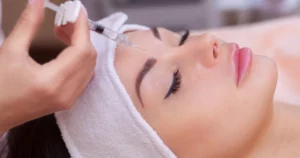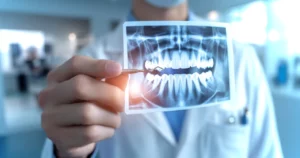In a chemical peel, the top layers of the skin are removed by applying a chemical solution to the skin. The skin that regenerates is softer. You might need to have a light or medium peel multiple times to obtain the desired results.
This post will discuss the different types of chemical peels, the risks associated with them, and the recovery process.
What are Chemical Peels?
Chemical peels are aesthetic procedures used on the hands, neck, and face. They are utilized to enhance the skin’s texture or appearance.
Chemical solutions will be applied to the area to be treated during this treatment, causing the skin to exfoliate and ultimately peel off. When this occurs, the new skin that emerges is frequently softer, less wrinkled, and may have sustained less damage.
There are several causes for why people could develop chemical peels. They might be attempting to address several conditions, such as:
- Fine lines and wrinkles
- Sun damage
- Acne scarring
- Hyperpigmentation
- Scars
- Melasma or sun spots
- Uneven skin tone and redness
The Different Types of Chemical Peels
Depending on the person’s requirements, we can use several intensities and depths of SkinMedica Chemical peels to treat their concerns. Deeper peels have more potent chemical strength and usually require longer recovery times than milder peels.
Based on your skin type, our skincare specialists will choose the chemical peel that is the safest and most effective for you.
Superficial Peels
Alpha-hydroxy acids are used in superficial peels, also known as light peels, to exfoliate the skin gently. Only the topmost layer of skin is penetrated.
Medium Peels
Trichloroacetic or glycolic acid is used in medium peels to penetrate the middle and outer layers of skin. The deeper penetration increases its ability to remove damaged skin cells.
Deep Peels
Deep peels, which frequently involve phenol or trichloroacetic acid, completely penetrate the middle layer of the skin to remove damaged skin cells.
How Chemical Peel Procedures Happen
Deep peels could be performed in an outpatient surgery center; chemical peels are commonly performed in-office. They’ll likely ask you to tie your hair back before the treatment. Your face will be washed, and you might get eye protection like gauze or goggles.
If you’re getting a deep peel, your doctor might use a topical anesthetic to numb the region. Your doctor might also administer a regional anesthetic for deep peels, which will numb sizable areas. They are very likely to do this if you get treatment for your face and neck.
You’ll also receive an IV for deep peels, and your heart rate will be carefully observed.
Superficial Peels
The administering professional will use a cotton ball, gauze, or brush to apply the chemical solution, such as salicylic acid, to the region treated during a light peel. The skin will begin to whiten and sting a little. The chemical solution will either be eliminated afterward, or we will apply a neutralizing agent.
Medium Peels
Your doctor will apply the chemical solution to your face using gauze, a special sponge, or an applicator with a cotton tip during a medium chemical peel. Trichloroacetic acid or glycolic acid might be present. Trichloroacetic acid – also referred to as blue peel – may be given a blue tint.
A cool compress will be applied to the skin by your doctor when the skin starts to lighten. For up to 20 minutes, you can experience stinging or burning. Although they might provide you with a hand-held fan to cool your skin, there is no need for a neutralizing solution.
If you’ve had the blue peel, your skin will be blue, and it could stay that way for a few days.
Deep Peels
You’ll be asleep during a deep chemical peel. Phenol will be applied to your skin by the doctor using an applicator with a cotton tip. Your skin will become white or gray as a result.
To reduce the skin’s exposure to the acid, we will cut the treatment into 15-minute segments.
Chemical Peel Risks
Temporary side effects include stinging or burning, redness, dryness, and mild swelling. You can lose your ability to tan permanently if you get a thorough peel.
Chemical peels, however, may have more dangers and potentially harmful side effects. These consist of the following:
Skin tone changes, either for the better or worse. People with darker complexion may experience them more frequently.
Scarring. This side effect might last forever.
Infections. Following a treatment, herpes simplex patients may develop flare-ups. Chemical peels can very infrequently result in either bacterial or fungal infections.
Harm to the kidneys, liver, or heart. Deep peels contain phenol, which can harm the kidneys, liver, and heart muscles and lead to irregular heartbeats.
Chemical Peel Recovery
Recovery varies depending on which type of chemical peel you’ve had.
Light Chemical Peels
A typical recovery period lasts four to seven days. You could have transiently lighter or darker skin.
Medium Chemical Peels
After a medium chemical peel, your skin will heal in around five to seven days, though you might experience months-long redness. Your skin will, at first, swell, then develop crusts and dark spots before fresh skin is shown.
Deep Chemical Peels
Deep chemical peels will result in extreme redness, swelling, and burning sensations. The eyelids frequently swell shut. The new skin will begin to appear in approximately two weeks, though white patches or cysts may persist for a more extended period.
Redness frequently persists for several months.
Avoid the Risks of Chemical Peels
Couture Dentistry partnered with SkinMedica to produce the best results from chemical peels minus the hassles. In contrast to other chemical peels, SkinMedica peels employ a cutting-edge, non-invasive method of peeling.
With SkinMedica peels, we improve pigmentation concerns by fusing the newest generation of acids with regularly used peeling agents and stimulating collagen production. These peels often have little downtime and provide healthier, younger-looking skin with less melasma and acne scarring.
Schedule a chemical peel treatment with Couture Dentistry by calling 214-919-7040 or emailinginfo@couturedentist.com. We offer free consultations.


